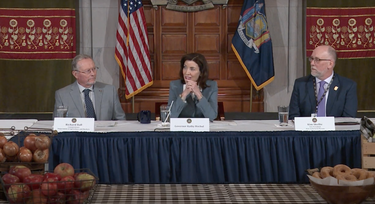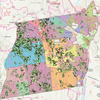Governor says she wants to hear from New Yorkers on impacts of new tariffs
“I want to know the impacts of tariffs on our farmers and people across the state,” Governor Kathy Hochul told farm leaders at a roundtable in Albany she convened on Tuesday, March 4, the day the Trump administration levied tariffs on Mexico and Canada and increased tariffs on China.
The tariffs on Chinese imports doubled from 10 to 20 percent while the tariffs on Mexico and Canada started at 25 percent. There’s an additional 10-percent tariff on energy resources from Canada. On March 6, Trump wrote on social media that he was suspending tariffs on most imports from Mexico and Canada until April 2.
The impact of the tariffs is expected to raise costs for the average New Yorker by as much as $1,200 a year, according to the governor’s office.
The state has established an email address for businesses, including farms, to report the effects of these tariffs. While the new policy begins to take effect, information provided to TariffImpact@esd.ny.gov “will help provide a real time understanding of the impact of the tariffs on the New York agricultural industry and other sectors across the state,” the governor’s office says.
“I'm well aware that it’s an $8.5 billion industry,” Hochul told the agricultural leaders who gathered on March 4. “This is critical to our success, critical to our economy, but also critical to our ability to just take care of our people and feed them the fresh fruits, and produce, and dairy that you manage and grow on your farms — over 32,000 family farms.”
The meeting table, covered with a checkered cloth, was laden with baskets of farm produce.
“What is the impact that you’re projecting now that tariffs will have on your business?” Hochul asked. “Because they're saying for an average family, the costs could go anywhere from $1,300 to $3,000 higher a year starting this year, because of the tariffs that are in place as of today with Canada and Mexico.”
Hochul termed Trump’s claim that the tariffs are a result of fentanyl coming into the United States illegally “a ruse.” She said that, despite Canada’s long border with the United States, “about 1 percent of the fentanyl that comes in this country comes over from Canada.”
Hochul went on, “It’s a ruse for finding an opportunity to really turn our relationships upside down with important countries that we rely on for partnership and markets for us. And if we lose them, they’re going to have retaliatory tariffs for us.”
Hochul also said, “We exported $22 billion worth of goods to Canada. They send over all kinds of supplies, fuel, aluminum, steel — you’re going to be rebuilding and we’re trying to rebuild our economy — it’s been a tremendously beneficial relationship.”
Assemblymember Donna Lupardo, a Democrat from Binghamton who chairs the Agriculture Committee, said in a release from the governor’s office, “The tariffs the president has imposed on Canada and Mexico, covers more than $900 billion worth of annual U.S. imports. Economists predict that this will deal a major setback to the entire northern American economy.
“The impact on agriculture alone will be significant. In New York we would expect to see an immediate impact on the cost of energy and fertilizer, along with a fear of retaliatory measures affecting exported dairy products, corn, soy beans, and feed grains.”
Michelle Hinchey, a Democrat who chairs the Senate’s Agriculture Committee said, “While many large farms across the country export their goods, New York farms maintain primarily local markets.
“However, tariffs are not one-sided, and with all but guaranteed retaliatory actions coming, our supply chains will become saturated by industry giants, squeezing our farmers and leaving many without a path to stay in business. Once we lose local farms, they rarely come back.
“That means less control over what we eat and where it comes from. Food security is national security, and these reckless policies put both at risk.”
Hochul told the March 4 roundtable participants that she would use the information she gathered from the talk and also from TariffImpact@esd.ny.gov “to build the argument when I’m speaking to our legislators, our Republican members of Congress who are in the majority in Washington, when I go to the White House. I want to have the stories, the data, and be able to talk about the impact that these tariffs have had on the state of New York.”



